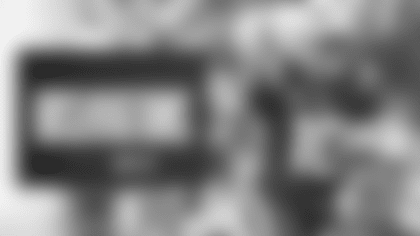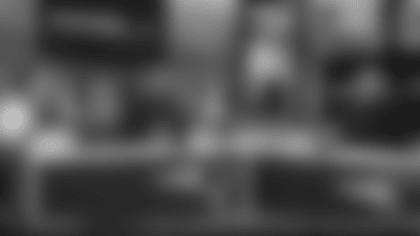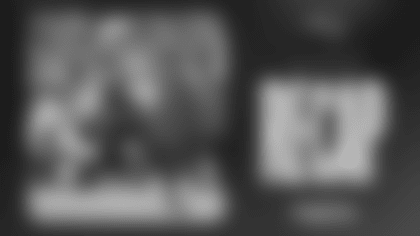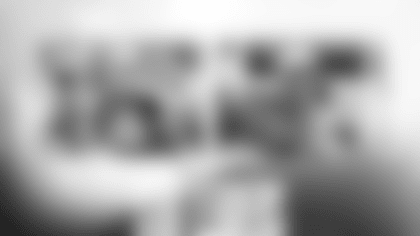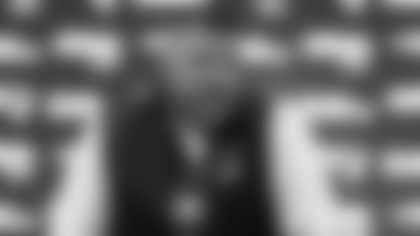[

]()
Q: As the season went along you went from a 3-4 to a 4-3. Does that say a lot about the players you have in that they were able to change?
RC: Sometimes in this business you have to be flexible and have to adapt to different circumstances and we were able to do that like you said our players, their concentration and their ability to do that was very helpful. So we made the transition and it has been good for us and I think that having the ability to do both things now causes some offensive trouble.
Q: Have you ever been around a team that switches as often as you do?
RC: Probably not that much, because basically I think generally you like to have one solid foundation and be able to play that and be successful with the one thing that you are doing. But because of our circumstance we've been able to go back and forth and it's been helpful, I believe.
Q: When you say, 'because of our circumstance,' could you explain what you mean by that? Do you mean the variety of talent that you have?
RC: Well a combination. When you get linebackers hurt and then you've got to try to get the best players in the game, and we had more healthy defensive linemen than we did linebackers. So to put linebackers out there who couldn't get it done or when we didn't have them we couldn't even put them out there. So we had to go with the linemen.
Q: I know you weren't here last year, but why does the Red Zone defense work so well this year?
RC: Well I can only speak for this year and I think that this year our guys, they focus when we get into that part of the field. They concentrate more. I think they make it a point not to let guys score or try not to let them score. And as a result of it we've been pretty fortunate in that area.
Q: Is there any such thing as a defensive player who just plays better in the Red Zone than he does on the rest of the field?
RC: Well sure.
Q: Are there people like that on this team?
RC: Well I think all of them, you can say all of them do that because if you look at the stats we are probably better in the Red Zone than we are in the other part of the field. But generally there is less ground to cover down there and the offenses begin to be somewhat limited in what they can do. So that has been able to work to our advantage.
Q: Do you think the Red Zone also plays to your personnel in that I think you are probably tougher than you are quick? On the big field you may not have the speed to stay with teams, but in that short area you have the toughness?
RC: Well true to a certain degree. I mean you have to be tough out on the field also. And we do have some people who have some speed. We might not be the fastest guys in the world, but we do have some speed.
Q: There have been a lot of new faces on defense and yet they are playing like they have been together for a long time? How is that?
RC: Several of those guys are our type players. You know we had them in New York and [Mike] Vrabel is one of those hard working kind of guys and that's who we kind of look for: overachievers, hard working, solid individuals. I think when you put those kind of guys together and maybe egos don't mean as much, that guys are able to play as a unit and play as a team and I think that's one of the things that we've been able to do is play as a team.
Q: How does this team compare to '96? The way they came back and made a run and got into the playoffs the way that team did?
RC: I tell you it is very similar to that team because that team started off, I think starting in that team we had more overall confidence because we had been together just a little. And this team not having been together, I think we had to gain confidence and develop that trust in each other. That's come along as this year's gone on.
Q: Can you make a parallel between what Richard Seymour has done this year and Lawyer Milloy in that year? He didn't start until the sixth or seventh game in '96?
RC: I really don't remember, but he didn't come on until late because I think that was what, his first year maybe? Yeah, he came on late. Seymour, I think that if we could eliminate his injury problems, that he would have been further along now than he is, but he has been a definite contribution because he is a playmaker inside.
Q: What is the defensive difference in the playoffs? Is there more weight on the defense in the playoffs? People say to win in the playoffs you have to have the best defense?
RC: I think on game day the team that plays the best is the team that generally wins. Now whether you have the best defense going in or not, your defense needs to play good that day. So I think that that's the thing that we have to focus on, is playing good when we play. If we go in as the best defense or go in as the worst defense, if we don't play good that day it is not going to be good enough.
Q: Bryan Cox's hit in the Colts game has been mentioned as a turning point in the season that set a physical tone. Is there a play that you remember thinking that this team was coming together?
RC: It's hard to say because I think there are several plays during the course of the year that have been big plays for us where we made plays. What was it, I believe it might have been San Diego on fourth-and-one and we stop them on forth-and-one. I think Bryan's hit in the Indianapolis game sent a message to our team that if you play physical and you be aggressive that you can get some things done. And I think that that was a good message that he sent.
Q: How has it worked out in the fact that Bill Belichick had your job before you? How has that helped you work together, the fact that he's been a defensive coordinator?
RC: Well he's been a pretty good one if you remember. And that in itself, he sees things and knows things about defenses and about offensive tendencies that are helpful. And he might make a suggestion, 'Why don't you try this?' Or, 'This team, this is the type of team that they are and this is kind of what we need to think about doing.' So he's had some input that's been helpful and that's good to have that kind of input.
Q: Last year players complained that the defense was too complicated. Now this year it seems with all the shifts that it is even more complicated. How have they adjusted? Did they just get it?
RC: No, I think they put more time in on it. They know that we do a lot of stuff so I think they put more time in on it and concentrate more and when you win that can solve a lot of problems. So the fact that we are winning makes them want to put more time in and concentrate more so that they can get it right.
Q: Is there a concern that while the scoring defense has been good, teams have been able to move the ball and threaten the goal line? Are you concerned that when you get into the playoffs that these teams are good enough where when they get in position they may have more success scoring touchdowns rather than settling for field goals?
RC: Sure, that is a concern every Sunday that you go out there. Definitely we are concerned about it and we're just going to go out and we're going to do the very best we can like we've done every Sunday. To this point, knock on wood [knocks on the podium], we've been able to make the plays and stop them and hopefully we can continue that.
Q: What has been the problem with teams moving the ball between the 20s?
RC: That's been a combination of things. I think you go into a game like Indianapolis and you definitely need to stop the pass. So you gear up to stop the pass and you open up some running lanes, like in I believe the second game. They ran the ball pretty good in the second game, but didn't hit the long passes and we were able to win that game. Then some games you go into you go in to stop the run. So you stop the run and you give up some pass plays. We're working to try to mesh it all together so that we can be good in all phases. It just hasn't worked out that we've been good in all of them yet, but we're still working toward that.
Q: You and a number of coaches have been in the playoffs before. How does that play into your preparation as a coach?
RC: Because you have been through it and you know what to expect you can inform the players about what they need to look for and things that they need to guard against like getting a big head or getting overconfident and things like that. And talk to them about the tempo of a playoff game increases, just like from the preseason to the regular season and those kinds of things to alert them to some things that you see and know that are going to occur. And if they are aware of those things, then when it happens on the field or when they encounter that situation they should be better because of it.
Q: Coach Belichick has talked about that you two have worked together so long you each know what the other is thinking. This is the first time he's been the head coach and you've been the coordinator, so how have your roles in working with each other changed from past jobs?
RC: I don't know that it's changed a lot because we have confidence; we both have confidence in each other. I think that he probably feels better about the defense knowing that what he wants done will be done and can get done and so that he can spend his time being the head coach and maybe he wasn't able to do that last year.
Q: How do you protect against what happened in Carolina from happening in the playoffs where they ran the ball so well? Was that just because it was the situation with Carolina or did they do something that other teams might be able to accomplish?
RC: No, I think that was more a function of our being out of position than anything that Carolina did particularly. Like for instance on a couple of running plays, they had guys outside. We had two guys outside and then they were able to bring the ball back down hill. Now some of that is guys being overzealous and trying to make a play rather than doing their job first. So that's one of the things that we have to try to get fixed before we play again, is everybody needs to be in position, do their jobs first and then they can help out.
Q: Was that maybe part of the fact that you were coming off of a bye week? Something that you would have to protect against when you play next as well?
RC: Well I don't think that that was the case. I think it was the fact that it was an important game and they knew the importance of the game and guys trying to make plays. And sometimes if you try to make a play and don't tell your buddy next to you that, 'I'm not going to be where I am supposed to be. I'm going to stunt over here.' And when I stunt without telling the guy next to me so he can cover up, that leaves a gap and that was happening to us.
**Q: By Sunday you will know who you are going to play and will have five days to prepare for them. What's the chance of them throwing a play at you that you haven't already seen?BB: Well you know there is always a chance, but by this point of the season we've seen most of their games or will have seen most of their games and so they have to make it up and that means that they haven't had as much time to work on it either. So you always have to guard against that and the only way that you really can do that is if guys do their job and if I've got contain, I keep contain. If I've got the reverse, I check for the reverse before I chase the ball. Then you can hopefully defend a play that you haven't seen.
**











